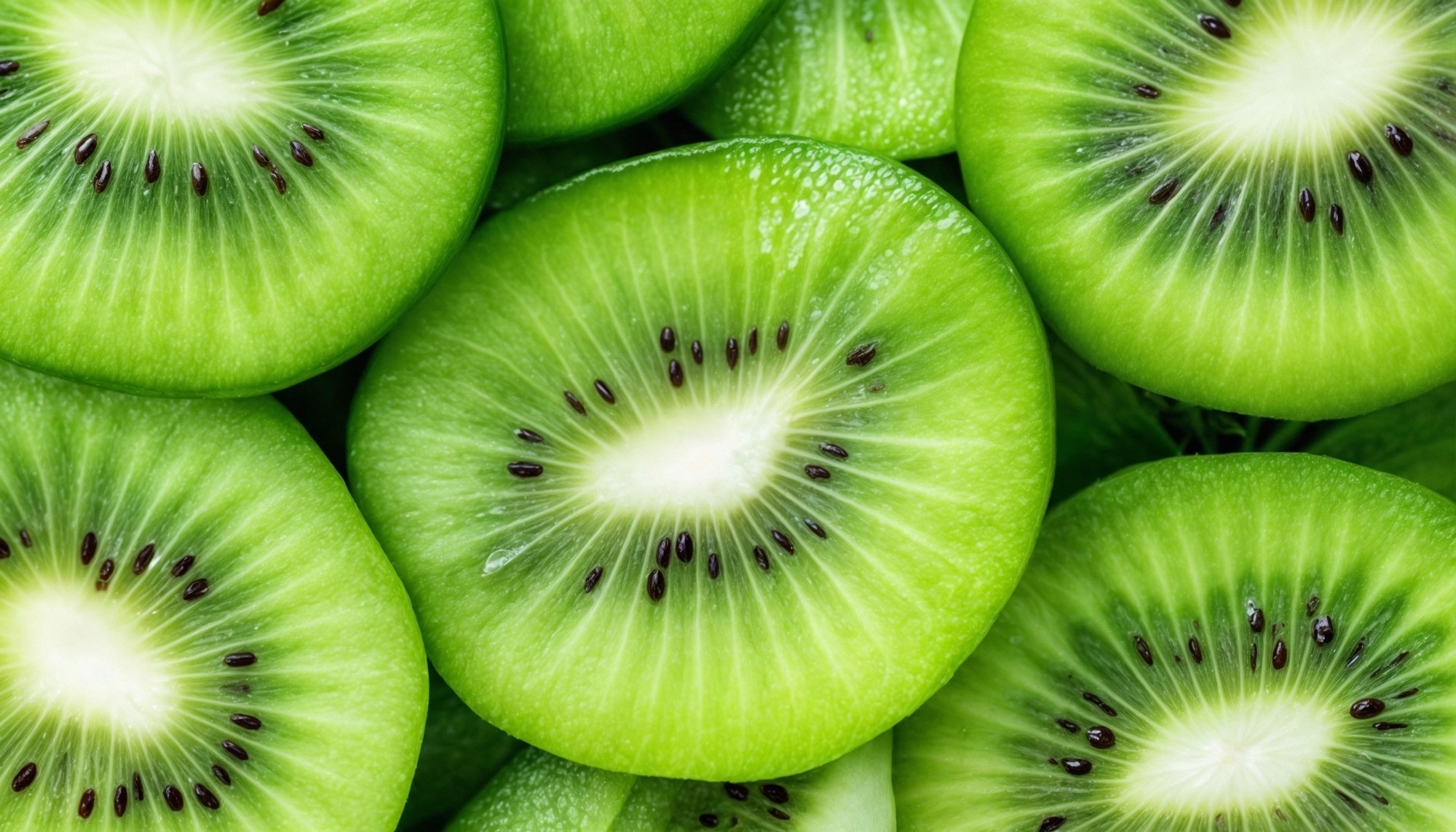Introduction
Nutritional Profile
Digestive Benefits
Immune Health
Other Potential Health Benefits
Practical Applications
Conclusion
References
Further reading
Kiwifruit is a nutrient-dense fruit rich in bioavailable vitamin C, fiber, and the proteolytic enzyme actinidin, providing scientifically validated benefits for digestive and immune health. Emerging evidence also suggests potential roles in improving sleep quality and reducing infection severity, reinforcing its classification as a functional food.

Kiwifruit" (Actinidia spp.) Image Credit: Meomeow / Shutterstock
Introduction
"Kiwifruit" (Actinidia spp.) is an umbrella term for several fruits demonstrating a uniquely nutrient-dense consumption value, and whose inclusion in dietary plans is increasingly supported by clinical evidence.
A growing body of scientific literature finds that kiwifruits are exceptionally high in bioavailable vitamin C, making them potent dietary tools for achieving optimal plasma levels of this essential antioxidant, which plays critical roles in immune function.4
A substantial body of research, including recent meta-analyses, confirms kiwifruits' efficacy in improving digestive health, particularly in alleviating functional constipation. This effect has recently been attributed to a multi-faceted mechanism involving these fruits' unique fiber matrix, notably high water-retention capacity, and the proteolytic enzyme actinidin, which are known to enhance protein digestion.1,2,5
Furthermore, human trials demonstrate that kiwifruit consumption can bolster immune resilience by reducing the severity and duration of upper respiratory tract infection symptoms, further validating its physiological benefits and underscoring its utility in modern dietary science and balanced, health-promoting diets.6
Sometimes colloquially referred to as "Chinese gooseberries," kiwifruits are a collective term for several edible berries from the genus Actinidia, characterized by their thin, fuzzy, fibrous skin and their unique tart flavor.1
In recent years, kiwifruit has transitioned from a Chinese ornamental plant to a crop of global nutritional importance, bolstered by increasingly global consumer interest in "superfoods" and the potential of natural nutraceuticals to promote healthy living.1,2
The green-fleshed Actinidia deliciosa and gold-fleshed A. chinensis are the most common globally distributed kiwifruit varieties, with production concentrated in China, New Zealand, Italy, and Greece. Notably, these four nations together account for about 85% of the world's kiwifruit crop production as of 2022.1,2
Scientific research increasingly supports kiwifruits' role as "functional foods," highlighting these fruits' numerous physiological benefits beyond basic nutrition. This article synthesizes the findings of recent scientific investigations on kiwifruit's impact on digestive and immune health, providing a critical overview for health professionals, medical policymakers, and consumers.
Nutritional Profile
The health benefits of kiwifruit are now attributed to its synergistic nutrient matrix. Studies have shown that as little as a 100 g serving of green kiwifruit provides ~65 kcal and ~58.8 mg of vitamin C (peeled green; values vary with cultivar and peel).1,3
Notably, this single small serving exceeds the daily recommended intake (100%) of vitamin C, highlighting these fruits' unexpectedly high concentrations of these physiologically critical micronutrients.1-4
Studies confirm that kiwifruit-derived vitamin C is highly bioavailable, effectively raising plasma levels in both animal models and clinical human trials.4 The fruit's ~2.1 g of dietary fiber per 100 g (peeled green; higher with skin/on some datasets) is composed of about one-third soluble and two-thirds insoluble fiber, a blend that has been observed to demonstrate an exceptionally high water-retention capacity, contributing to these fruits' digestive effects.1-3
While commercially popularized as a safe and natural alternative to synthetic or pill-based vitamin C interventions, recent evidence suggests that kiwifruits further provide other key micronutrients, including potassium ~312 mg (~7% DV) and folate ~33 µg (~8% DV) per 100 g (peeled green); vitamin E and vitamin K vary by dataset and peel status.1-3
Furthermore, biochemical studies and human trials have revealed that kiwifruits are unique sources of the bioactive actinidin, a natural protease enzyme that remains active in the stomach's acidic environment and is now known to enhance the digestion of various dietary proteins, thereby potentially reducing bloating.1,2
Comparing Kiwifruit - Red, Purple, Gold and Green Kiwi Varieties
Digestive Benefits
The strongest human-derived clinical evidence for kiwifruit's health benefits lies in its positive effects on overall gastrointestinal function.2 A 2024 systematic review and meta-analysis investigating kiwifruits' claimed digestive benefits confirmed that these berries significantly improve defecation frequency in adults with functional constipation.5
Similarly, human randomized controlled trials (RCTs) have shown that as few as two green kiwifruits consumed daily can effectively improve symptoms in patients with functional constipation and, in some trials, IBS-C.2
Finally, in a comparative trial with prunes and psyllium, kiwifruit showed similar efficacy and fewer adverse effects than either, underscoring its safety and well-tolerance.9
Kiwifruits have been classified in the fermentable oligosaccharides, disaccharides, monosaccharides, and polyols (FODMAP) food system as low-FODMAP foods, validating their suitability for many individuals with digestive sensitivities and restricted dietary access to harder-to-digest foods at ~ two small peeled kiwifruits per serve (≈150 g).2
The growing consumer popularity of kiwifruits, alongside the search for safe, natural nutrition interventions, has bolstered research into kiwifruit's physiological benefits.1,2 While admittedly limited in terms of their real-world human validation, previous research (murine and human RCTs) has resulted in a robust scientific understanding of kiwifruits' mechanisms of action.1,2,5
These mechanisms have been revealed to be threefold: (1) Physical action of soluble and particularly insoluble fiber, kiwifruits' unusually high fiber content bolsters its water-holding capacity, which swells in the colon. This substantial water content has been linked to softer, bulkier stools, thereby decreasing transit time and mitigating the risk of constipation.1,2
(2) Biochemical action of actinidin, by improving protein breakdown in the upper gastrointestinal (GI) tract, actinidin may reduce feelings of fullness and bloating. Notably, however, research in this field is nascent, with most investigations providing confounding outcomes.1,2
(3) Microbiota modulation, these fruits' polysaccharides have been shown to act as prebiotics, promoting the growth of beneficial gut bacteria like Lactobacillus and Bifidobacterium, which supports long-term bowel health, although mechanistic evidence in humans remains limited.1,2
Immune Health
Kiwifruit consumption is increasingly linked to enhanced immune function, primarily due to these fruits' high concentration of bioavailable vitamin C. Vitamin C is an essential micronutrient for innate and adaptive immunity and several housekeeping physiological functions.4
Notably, a key randomized trial in adults (age> 65 years) found that daily consumption of gold kiwifruit (n = 4) did not significantly reduce the incidence of upper respiratory tract infections (URTIs).6
However, the same study demonstrated a significant reduction in the severity and duration of head congestion and sore throat following routine kiwifruit consumption, suggesting that kiwifruit enhances immune resilience, helping the body manage infections more effectively. The study linked the observed benefit to a significant increase in participants' plasma vitamin C levels resulting from consistent kiwifruit ingestion.6
Other Potential Health Benefits
While kiwifruits' vitamin C and fiber-based benefits are well documented, research into other areas shows promising but more preliminary findings:
Antioxidant and Anti-inflammatory Effects
Beyond vitamin C, kiwifruit has been found to contain varying concentrations of vitamin E, carotenoids, and polyphenols, providing these fruits with a significant total antioxidant capacity.1
These potent antioxidants are thought to help protect cells from oxidative stress and DNA damage. Furthermore, preliminary findings suggest that frequent kiwifruit consumption may help mitigate the low-grade inflammation underlying many chronic diseases (e.g., cardiovascular diseases [CVDs] and some cancers).1,3
Cardiovascular and Metabolic Health
Evidence for kiwifruits' benefits in this area is largely conflicting, while some individual RCTs have reported modest cardiovascular and metabolic benefits (e.g., small yet statistically significant reductions in systolic blood pressure). A 2019 systematic review and meta-analysis found no statistically significant effect of kiwifruit on blood pressure, blood lipids, glycemia, insulin resistance, or body weight in at-risk adults.7
This indicates that strong claims about kiwifruit's direct therapeutic effects are not yet supported by human clinical evidence, warranting medical caution in cases of unsupervised consumption.7
Sleep Quality Enhancement
Emerging research suggests kiwifruit may help improve sleep quality, with one small, self-controlled study finding that consuming two kiwifruits 1 hour before bed consistently for 4 weeks significantly decreased the time to fall asleep by ~35%.8
Kiwifruit consumption was also associated with reduced waking time and increased total sleep time (~13%), possibly due to the fruit's antioxidant and serotonin content.8
Practical Applications
Evidence-based clinical guidance recommends green kiwifruit as a food-based option; many RCTs used two kiwifruit per day for adults with chronic constipation, with recommendation strength derived from systematic reviews and consensus processes.10
For constipation, the green kiwifruit (A. deliciosa) is preferred over other kiwifruit varieties due to its higher fiber and actinidin content. In contrast, both green and gold kiwifruit varieties are known to be excellent for immune support.1,2,6

Ripe kiwifruits (Actinidia deliciosa) Image Credit: Wirestock Creators / Shutterstock
Research suggests that the fruit should be consumed whole and raw to maximize its physiological benefits. The process of juicing reduces fiber content, and heat processing can denature actinidin, which would otherwise compromise these fruits' digestive effects. Notably, kiwifruit skin is edible and has been shown to boost fiber, vitamin E, and folate intake significantly.1,2
Conclusion
Extensive clinical and nutritional research identifies kiwifruit as a functional food supported by substantial evidence. The most consistent benefits relate to digestive function, while emerging data suggest that regular consumption may help reduce the severity and duration of upper respiratory tract infection symptoms by enhancing vitamin C status.4,6
Kiwifruit serves as a natural, well-tolerated, and evidence-based dietary option for managing functional constipation, primarily due to its distinctive fiber composition and actinidin enzyme activity. In contrast, current clinical findings do not show consistent improvements in cardiometabolic markers among at-risk adults.7
References
- Richardson, D. P., Ansell, J., & Drummond, L. N. (2018). The nutritional and health attributes of kiwifruit: a review. European Journal of Nutrition, 57(8), 2659–2676. DOI:10.1007/s00394-018-1627-z, https://link.springer.com/article/10.1007/s00394-018-1627-z
- Nasser, J., Hollander, B., & Chang, B. W. (April 2024). Kiwifruit in the clinic: Nutritional insights and evidence-based applications for constipation. Practical Gastroenterology, 48(4), 36–44. No DOI available. https://practicalgastro.com/wp-content/uploads/2024/06/Nutrition-April-2024.pdf
- U.S. Department of Agriculture, Agricultural Research Service. (2025). FoodData Central. No DOI available. https://fdc.nal.usda.gov/food-details/2710831/nutrients. Accessed 17 October 2025.
- Carr, A., & Maggini, S. (2017). Vitamin C and Immune Function. Nutrients, 9(11), 1211. DOI:10.3390/nu9111211, https://www.mdpi.com/2072-6643/9/11/1211
- Cokro, F., Vashti, E., Nurcahyanti, A. D. R., Sumarpo, A., & Malasao, R. (2024). A Systematic Review and Meta-Analysis of Kiwifruit's Impact on Functional Constipation. Biomedical and Pharmacology Journal, 17(2), 635–646. DOI:10.13005/bpj/2891, https://biomedpharmajournal.org/vol17no2/a-systematic-review-and-meta-analysis-of-kiwifruits-impact-on-functional-constipation/
- Hunter, D. C., Skinner, M. A., Wolber, F. M., Booth, C. L., Loh, J. M. S., Wohlers, M., Stevenson, L. M., & Kruger, M. C. (2011). Consumption of gold kiwifruit reduces severity and duration of selected upper respiratory tract infection symptoms and increases plasma vitamin C concentration in healthy older adults. British Journal of Nutrition, 108(7), 1235–1245. DOI:10.1017/S0007114511006659, https://www.cambridge.org/core/journals/british-journal-of-nutrition/article/consumption-of-gold-kiwifruit-reduces-severity-and-duration-of-selected-upper-respiratory-tract-infection-symptoms-and-increases-plasma-vitamin-c-concentration-in-healthy-older-adults/10.1017/S0007114511006659
- Suksomboon, N., Poolsup, N., & Lin, W. (2019). Effect of kiwifruit on metabolic health in patients with cardiovascular risk factors: a systematic review and meta-analysis. Diabetes, Metabolic Syndrome and Obesity: Targets and Therapy, 12, 171–180. DOI:10.2147/DMSO.S193225, https://www.dovepress.com/effect-of-kiwifruit-on-metabolic-health-in-patients-with-cardiovascula-peer-reviewed-fulltext-article-DMSO
- Lin, H. H., Tsai, P. S., Fang, S. C., & Liu, J. F. (2011). Effect of kiwifruit consumption on sleep quality in adults with sleep problems. Asia Pacific Journal of Clinical Nutrition, 20(2), 169–174. DOI:10.6133/apjcn.2011.20.2.06, https://apjcn.nhri.org.tw/server/APJCN/20/2/169.pdf. Accessed 17 October 2025.
- Chey, S. W., Chey, W. D., Jackson, K., & Eswaran, S. (2021). Exploratory Comparative Effectiveness Trial of Green Kiwifruit, Psyllium, or Prunes in US Patients With Chronic Constipation. American Journal of Gastroenterology, 116(6), 1304–1312. DOI:10.14309/ajg.0000000000001149, https://journals.lww.com/ajg/Fulltext/2021/06000/Exploratory_Comparative_Effectiveness_Trial_of.14.aspx
- Dimidi, E., Barrett, K., Farmer, A. D., Lomer, M. C., Scott, S. M., & Whelan, K. (2025). British Dietetic Association Guidelines for the Dietary Management of Chronic Constipation in Adults. Journal of Human Nutrition and Dietetics, 38(5), e70133. DOI:10.1111/jhn.70133, https://onlinelibrary.wiley.com/doi/10.1111/jhn.70133
Further Reading
Last Updated: Oct 23, 2025